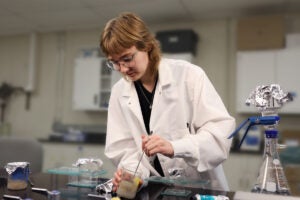AUSTIN, Texas — President Clinton today (Oct. 24) named Dr. David P. Morton, assistant professor in the department of mechanical engineering at The University of Texas at Austin, among 20 young National Science Foundation (NSF)-supported researchers to receive the second annual Presidential Early Career Awards for Scientists and Engineers.
The presidential honor is the highest bestowed by the U.S. government on outstanding young scientists and engineers who are in the early stages of their independent research careers.
“It was certainly nothing I expected, and it’s nothing you earn as an individual,” Morton said. “I work with highly talented UT faculty and students in both the engineering and business schools, and in local industry. This award recognizes the importance of operations research in a national sense, as well as the strength of the operations research program at UT.”
Morton specializes in operations research with applications in manufacturing and telecommunications. He graduated from Stetson University with a B.S. degree (1987) in mathematics and physics and from Stanford University with an M.S. (1990) and Ph.D. (1993) in operations research.
His current research focuses on developing ways to standardize decision-making to help managers take into consideration a full range of contingencies. “We help managers make the best user of resources in the face of a wide range of uncertainties,” such as consumer demand, Morton said.
Before coming to UT in 1995, he spent two years at the Naval Postgraduate School, first as a National Research Council Postdoctoral Fellow and then as a visiting assistant professor. He is the recipient of a National Science Foundation Career Award, the 1997 Rist Paper Prize, the 1994 George E. Nicholson Paper Prize, and was a finalist for the 1994 George B. Dantzig Dissertation Award.
His research interests are in developing applications, algorithms and theory for solving optimization problems of complex systems that contain significant uncertainties. He also has worked on projects involving specific applications in water resources, electric power systems, manufacturing, strategic airlift, finance and telecommunications.
Sixty presidential awards were announced overall, spread among eight federal agencies.
The awards were established by President Clinton in February, 1996, to meet the Administration’s goals of producing the finest scientists and engineers for the 21st century, while maintaining U.S. leadership across the frontiers of scientific research.
“These gifted young professionals exemplify the best of our science and technology community and will help set the scientific pace for the U.S. and the world in the years ahead,” said the President. “Their passion for discovery and their determination to explore new scientific frontiers will drive this nation forward and build a better America for the 21st century.”
Ten government agencies join together annually to nominate the promising scientists and engineers who will receive up to $500,000 over a five-year period to further their research. The young scholars are recognized through these awards for their research contributions, their promise and for their commitment to broader societal goals. In addition, their work supports advances in science for important government missions.
NSF selects its nominees for the presidential early career awards from a group of its most meritorious Faculty Early Career Development (CAREER) program scientists and engineers. They have received NSF support because of exceptional research and leadership potential in their fields, and their integrated contributions to research and education.
The presidential early career awards will be presented in a White House ceremony on Nov. 3.



